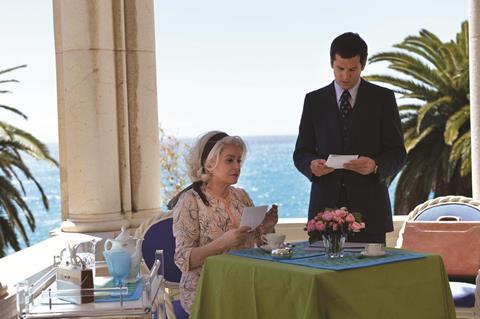Dir: André Téchiné. France 2014. 116 mins

French writer-director André Téchiné is a past master at creating narratively complex films that have the stimulating density of novels, and page-turners at that. When it comes to true crime, however, as in the curious In the Name of My Daughter (L’Homme Qu’on Aimait Trop), he’s on less firm terrain. This tale of wealth, passion and (possibly) murder, executed in a style that’s visually high gloss yet narratively muddy, comes across like an old-fashioned TV mini-series, considerably tawdrier yet finally duller than Téchiné’s best efforts.
The acting is certainly the film’s trump card, with Canet relishingly snake-like, and the ever more impressive Haenel mustering a troubling intensity as the doomed, passionate Agnès.
That the film is based on a well-known French case should give it some domestic theatrical clout (the film opens in France in July). But elsewhere, prospects will rest on Téchiné’s variable commercial reputation and the enduring international repute of Catherine Deneuve, daring to play dowdy for once.
In fact Deneuve’s first appearance, as a shuffling grey-haired lady in very unflattering shoes, takes her way beyond the matronly register she tried out in François Ozon’s Potiche. Here she plays a woman broken both emotionally and financially - Renée Le Roux. As the prologue establishes, Renée has been trying for years to re-open the dismissed legal case against one Maurice Agnelet (Guillaume Canet), who she believes murdered her daughter Agnès years earlier.
The film then skips back 30 years to the 1970s, as the newly divorced Agnès (Adèle Haenel) returns to Nice, where Renée is the figurehead of a successful casino, the Palais de la Méditerrannée. Adèle gets involved with her mother’s majordomo, lawyer Maurice, and soon starts an affair with him, although he’s married and has several mistresses (one of them sparkily played by Judith Chemla).
Renée contrives to fully assume the directorship of the Palais, which soon plummets into financial calamity, while Maurice rebels against her when she fails to make him its manager. Agnès, meanwhile, is upset that Renée won’t hand over the considerable inheritance that’s due her, and so the calculating Maurice contrives a deal whereby he and Agnès share an advance on the money from local mafioso Fratoni (Jean Corso, bullish but suave).
As mother and daughter fall out, Maurice’s motives turn ever murkier, and Agnès ever plunges deeper into passionate infatuation, viewers may feel that they’d get more sense, and perhaps more dramatic nuance, from the book that Renée Le Roux herself co-wrote about the case (with her son Jean-Charles, co-writer on the film too). A stolid courtroom coda may leave us none the wiser, but places the weight of the film firmly back with Deneuve, who is fairly magnificent throughout - whether as the haggard older Renée or as the glittering grande dame of the casino scene.
The acting is certainly the film’s trump card, with Canet relishingly snake-like, and the ever more impressive Haenel mustering a troubling intensity as the doomed, passionate Agnès. But the dramatic sluggishness is compounded by an often ugly, even kitsch playing-up of colour in Julien Hirsch’s photography - which, like Benjamin Biolay’s oppressively soupy score, is presumably channeling Dynasty-era TV gloss, but to jarring effect.
Production company: Fidélité
International sales: Elle Driver, sales@elledriver.eu
Producers: Olivier Delbosc, Marc Missonnier
Screenplay: André Téchiné, Jean-Charles Le Roux, Cédric Anger, based on the book Une Femme Face à la Mafia by Renée Le Roux and Jean-Charles Le Roux
Cinematography: Julien Hirsch
Editor: Hervé de Luze
Production designer: Olivier Radot
Music: Benjamin Biolay
Main cast: Guillaume Canet, Catherine Deneuve, Adèle Haenel, Jean Corso





















